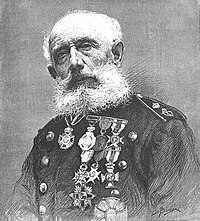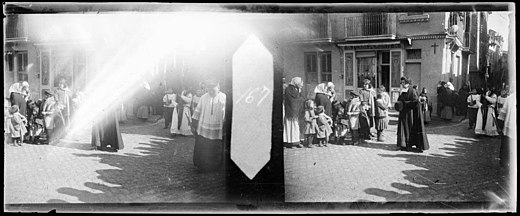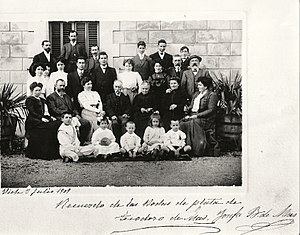Teodoro de Mas y Nadal
Teodoro de Mas y Nadal | |
|---|---|
| Born | Teodoro de Mas y Nadal 1858 |
| Died | 1936 Vilanova de Sau, Spain |
| Nationality | Spanish |
| Occupation(s) | entrepreneur, landowner |
| Known for | engineer, politician |
| Political party | Carlism |
Teodoro de Mas y Nadal (Catalan: Teodor de Mas i Nadal) (1858–1936) was a Spanish engineer and politician. He contributed to the development of railway, road, hydrological and energy infrastructure, mostly in Catalonia, though also in other regions of Spain and in Argentina. Politically he supported the Traditionalist cause. Prior to 1919 and after 1931 he remained active in the Carlist ranks; in 1917-1919 he was member of the regional Catalan party executive. In the 1920s he headed regional Catalan structures of the breakaway Traditionalist grouping known as the Mellistas.
Family and youth[edit]
The landowner Mas family has been for centuries related to Osona. Teodoro's great-grandfather, Teodoro de Mas Solá (1774-1816), distinguished himself commanding anti-French insurgency during the Peninsular War.[2] However, he is better known as husband of Joaquina de Vedruna, Teodoro's great-grandmother; already a widow, in 1825 she founded the Carmelite charity order and was declared saint in 1959.[3] Their son and Teodoro's grandfather, Joaquín José de Mas y de Vedruna (1801-1873), sided with the legitimists during the First Carlist War and then went on exile. His son and Teodoro's father, Luis de Mas y Poudevida (1824-1895),[4] as a 13-year-old joined his parent in the legitimist ranks.[5] He then studied geodesy and topography in France, was involved in another Carlist attempt of 1848 and went on exile again.[6] Author of a geodetic manual,[7] back in Spain he engaged in hydraulic engineering[8] and in the 1860s ran a technical college in Barcelona, an institution he founded himself;[9] he also managed a local railway line.[10]
Luis de Mas married Elvira Nadal Valls (1833-1912);[11] the couple lived at the Manso Escorial estate near Vich.[12] They had at least 8 children, born between 1853 and the 1870s; Teodoro was the third in sequence, but the first son. Nothing is known of his early education. As a 14-year-old he escaped from home to join the legitimists during the Third Carlist War; twice rejected due to his age, he was eventually admitted to Real Cuerpo de Ingenieros; the structure was commanded by his own father.[13] Already as an adolescent nominated alférez following the battle of Ripoll,[14] he took part in various skirmishes in Catalonia[15] until transferred to the Northern Front; he entered personal guard of the claimant and after the 1875 battle of Lumbier he was awarded Cruz del Mérito Militar. He was then sent on an unspecified mission to France, but was detained when trying to cross back to Spain and interned in Montauban until the end of hostilities.[16]

None of the sources consulted provided information on Mas’ fate after the war, except that together with his father they spent a few years on exile. At unspecified time though probably in the late 1870s or early 1880s he studied engineering, most likely in France.[17] He returned to Spain in 1883 latest,[18] reportedly to take over the family economy.[19] In 1884 he married Josefa Bach Puig (1865-1930),[20] descendant to a Vich Liberal family.[21] The couple settled at the Mas estate and had at least 7 children, born between 1885 and 1904.[22] Two of his sons died in youth in 1910-1911, another one perished in 1937;[23] none of the remaining brothers and sisters became a public figure. Among Teodoro's sons-in-law Juan Travería Pubill was the alcalde of Vich, while Manuel Gaus Ripoll gained his name as an architect.[24] Teodoro's brother Luis was manager of El Legitimista Español, issued in Buenos Aires.[25] Teodoro's brother-in-law, Antonio Bach Puig, was involved in Macia's conspiracy of 1924.[26] Among 17 grandchildren the best known one is Manel Gausa de Mas, an architect and photographer.[27]
Engineer[edit]

It is not known exactly what discipline of engineering Mas has studied. He practiced in civil engineering, though he tried his hand at many sub-disciplines: railways, roads, hydro technical works, power generation and industrial facilities. He was first noted as engaged in construction works in 1884, the last such note comes from the 1910s. His projects focused mostly on Catalonia, though he was recorded also in León, La Mancha and in Argentina. A hagiographic note maintains that some of his endeavors were unsuccessful due to factors beyond his control;[28] no independent source is available to confirm this claim.
The field which attracted most of Mas’ attention was hydro technical projects. Most of these works were focused on Catalonia; the only exception were the 1880s works at Saltos del Duero in the province of Salamanca.[29] At unspecified time he engaged in a project related to the Monellots fonts, located near Vich;[30] since the 1860s works supposed to use it as supply of water for domestic Vich usage were dragging on.[31] Much more ambitious was a plan focused on the Noguera Pallaresa river; its waters were to be piped to Barcelona over a distance of some 100 km.[32] None of the sources consulted provides information either on outcome of both projects or about commercial format of the enterprises. In 1901 Mas was granted a license to exploit waters of the Ter river, flowing through the Northern Catalonia;[33] the business ran into difficulties, was re-defined commercially[34] and continued at least into the early 1910s.[35] It was the most successful of Mas’ projects; on his own real estate Molí de Sau he constructed a hydro power plant;[36] using 15,000 V lines and on a distance of some 13 km it delivered electricity to Vich, where power was further distributed for domestic use via 500 V lines.[37]
Railway transport kept Mas busy from the 1880s to the 1900s. Already in 1884 he was recorded as engaged in development of local network in the province of Salamanca, though no details are available.[38] In the late 1880s he contributed to buildup of railway infrastructure in the Argentinean province of Corrientes,[39] vaguely noted as engrossed with “varios ferrocarriles”.[40] In the early 1890s he was among promoters of a narrow-gauge railway line supposed to plug Vich into the already existent network; the track was to cross the Guilleries massif and join the Girona – Olot line in Pasteral d’Amer.[41] He was granted the license for both construction and operation of the railway, but the project moved on grudgingly; in 1901 the license was renewed,[42] but eventually the so-called Ferrocarril a la Selva failed to materialize. Another transport engineering discipline that Mas engaged in was road construction; in the mid-1880s he contributed to development of local network in the province of Albacete.[43] Last but not least, he was engaged in construction of other industrial facilities; he is credited for design and construction of a La Fé ceramics factory in Buenos Aires.[44]
Politician: from inactivity to Carlist regional executive[edit]
Following the juvenile wartime episode in the Carlist ranks Teodoro Mas for decades remained only moderately engaged in Traditionalist politics. In 1889 he joined the just opened Vich círculo of Alta Montanya,[45] headed by his father,[46] and entered its executive.[47] However, information on his partisanship for the cause in the 1890s and 1900s is scarce and limited to various donations and subscriptions, e.g. to erect a monument to Zumalacárregui[48] or to honor the party leader, Marqués de Cerralbo.[49] An isolated case of his open bid for public post is the 1899 electoral campaign for the local self-government; Mas stood as a Carlist but despite the family prestige and own economic position in the county he failed to make it to the Vich ayuntamiento.[50] Historiographic works on either Catalan[51] or nationwide[52] Traditionalist politics at the turn of the centuries do not record him as engaged in internal party structures, their propaganda or electoral campaigns, and this is despite Vich having been among most Carlist districts in Spain, with one Cortes ticket won in 1891 and another in 1907.[53]
Nothing is known about Mas’ views on questions which caused vehement debates and undermined unity of the Catalan Carlism of the era: temptations of another insurgency, position versus rising Catalanism, violent urban pistolerismo or emerging syndicalism. One scholar counts him among most prestigious party men in Osona county, yet he provides no details and suggests that their activity was mostly about adhering to Catholic rituals and observing traditional social routine.[54] Mas assumed more active stance in the mid-1910s, noted in the press as taking part in local county rallies[55] and contributing few pieces to the party press.[56] In 1916 de Cerralbo, in agreement with the regional jefé Junyent and the provincial one Duque de Solferino, nominated Mas the leader of the comarcal party structures in Vich.[57] Following shakeup in the regional executive and resignation of Junyent, in 1917 Mas entered the Catalan Junta Regional, this time led by Solferino.[58]
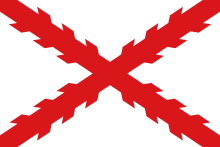
The late 1910s was the period of Mas’ most active stand. In 1917 he was nominated jefe of Comité de Acción Política, a body supposed to co-ordinate all Carlist electoral action in Catalonia.[59] The same year he fielded his candidature for the Barcelona Diputacíon Provincial. He stood in the Vich-Granollers district as a Jaimist representative[60] in Coalició Anticaciquista, an alliance posing as anti-establishment alternative to the corrupted Restoration regime.[61] The bid proved unsuccessful and he was the second worst-faring candidate in the district.[62] Undeterred, Mas continued his electoral labors and prior to the national 1918 campaign he co-signed a grand Manifiesto. Itself a lecture of Traditionalist program, the text advocated corporative instead of popular suffrage, separate regional establishments, moderate monarchy headed by Jaime de Borbón, Spain “limited only by the sea and the Pyrenees” and protectionist and regulated economy; unorthodox proposals were only voluntary military service, “properly understood” freedom of education and economic separation between state and the Church.[63] The efforts were moderately successful, as there were 2 Carlist MPs elected from Catalonia.[64]
Politician: from Mellista to reconciled Carlist[edit]

There is no evidence of Mas’ partisanship during a long-maturing conflict between the key party theorist Vázquez de Mella and the claimant Don Jaime; when it climaxed in the 1919 secession of the Mellistas, Mas joined the dissenters. The entire Junta Regional resigned in corpore[65] and Mas declared his access to the new Partido Católico Tradicionalista. His manifesto read that “antes los principios que la persona del Rey”;[66] the Jaimista press agonized about Mas’ rebelling against two generations of his ancestors.[67] In late 1919 he became the Catalan leader of the Mellistas; he co-signed an address to the Carlist infant Don Alfonso Carlos in vain hope to attract him.[68] In 1920-1921 he engaged in buildup of new structures and mobilization of public support; as “patriarca del tradicionalismo catalan” he headed rallies either in Barcelona[69] or elsewhere,[70] co-ordinated electoral action,[71] welcomed de Mella in Catalonia,[72] and hailed “enormous enthusiasm” of the Catalan Mellistas;[73] indeed scholars note that Catalonia was among regions with most vehement support for the cause.[74] However, the party structures were emerging slowly and there was growing rivalry between de Mella and his disciple, Víctor Pradera.[75] In late 1922 Mas was co-presiding[76] over the grand Mellista assembly in Zaragoza;[77] it was entirely controlled by Pradera.
Structures of the new party failed to materialize before the 1923 coup of Primo de Rivera. Shortly afterwards Mas issued a manifiesto; it saluted “patriótico movimiento que el ejercito español acaba de hacer”, declared total adhesion of the Catalan Mellistas, and noted that the new regime should not only do away with the corrupt system, but its next step should be implementation of Traditionalist principles. The document played down dynastic issues and noted that any king adhering to Traditionalist doctrine would be legitimate.[78] In 1923-1924 he kept supporting the new regime,[79] e.g. heading “afirmación patriótico-tradicionalista” in Vich;[80] however, his position changed.[81] In 1925 he openly voiced skepticism about centralizing policy which he considered anti-Catalan;[82] in the late 1920s the Vich Traditionalists withdrew from primoderiverista structures and few took part in organizations like Unión Patriótica or Somatén.[83]
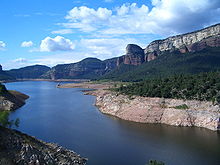
When Second Republic was declared Mas was a widowed septuagenarian, politically tending to inactivity.[84] However, he resumed public role following the death of Don Jaime; in late 1931 he declared loyalty to the new Carlist claimant Don Alfonso Carlos[85] and re-entered Comunión Tradicionalista,[86] which following 12 years of dissidence marked his return to orthodox Carlism.[87] He did not assume any position in the party[88] and enjoyed rather the status of a Traditionalist patriarch;[89] his role was about occasionally appearing on public rallies, like in 1934,[90] or donating money to the cause, like in 1936.[91] Upon outbreak of the Civil War Mas fled to his property near Vilanova de Sau, but following few weeks he was tracked down by the anarchist-dominated Comitè Antifeixista of Vich. A hit-squad, led by Vicenç Coma Cruells,[92] appeared at the Molí de Sau estate. Mas confronted them at the doorstep of his house and was shot together with his son-in-law.[93]
See also[edit]
Footnotes[edit]
- ^ most sources claim that Teodoro Mas has been born in Vich, compare e.g. Xavier Tornafoch, Política, eleccions i caciquisme a Vic [PhD thesis Universitat Autonoma de Barcelona], Barcelona 2003, p. 408. However, a municipal register from 1920 notes his birthplace as Barcelona, see España, Provincia de Barcelona, registros municipales, 1387-1986, p. 579, available on the FamilySearch service here
- ^ New Catholic Encyclopedia, vol. 2, Washington 2003, ISBN 0787640069, p. 429
- ^ Gran Enciclopedia Rialp, vol. 13, Madrid 1981, p. 478
- ^ Luis de Mas y de Poudevida entry, [in:] Geneanet genealogical service, available here
- ^ the boy was nominated “oficial auxiliar” of his father, who at the time was the Carlist comisario de guerra
- ^ Francisco de Paula Oller, Album de personajes carlistas con sus biografías, vol. 3, s.l. 1887, p. 20
- ^ El Ancora 29.12.51, available here
- ^ La Epoca 03.01.56, available here
- ^ Diario de Avisos 01.10.66, available here
- ^ La Corona 06.09.84, available here
- ^ Elvira Nadal y Valls entry, [in:] Geneanet genealogical service, available here
- ^ de Paula Oller 1887, p. 25
- ^ Mas’ possessions were embargoed in 1867, which suggests that already at the time he was considered a potential rebel, El Pensamiento Español 02.09.67, available here. In 1868 he was nominated (Carlist) Subcomisario Regio de Cataluña, de Paula Oller 1887, p. 21
- ^ El Correo Español 10.08.16, available here
- ^ he is noted as engaged in action by Campdevánol, Berga, San Hilario, Anglés, Prats de Llusanés, Olot, Seo de Urgel and Bañolas, El Correo Español 10.08.16
- ^ El Correo Español 10.08.16
- ^ Tornafoch 2003, p. 408
- ^ in 1883 Teodoro Mas was noted as active organizing a local Vich feast, La Vey de Montserrat 14.04.83, available here
- ^ El Correo Español 10.08.16, available here
- ^ Josefa Bach Puig entry, [in:] Geneanet genealogical service, available here
- ^ her father, José Bach Serra, was counted among “republicanos federales” in 1871, La Epoca 01.04.71, available here. He practiced as a lawyer, Anuario-Almanaque del Comercio 1879, available here. In the late 1880s he was considered a liberal fusionista, La Dinastía 01.07.87, available here
- ^ Teodoro de Mas y Nadal entry, [in:] Geneanet genealogical service, available here
- ^ circumstances of his death are not clear. It is not known whether he died in combat, was victim of repression of passed away regardless of the civil war
- ^ Es cedeix a l’Ajuntament de Taradell l’arxiu documental de l’arquitecte Manel Gausa Raspall, [in:] Taradell service 10.10.18, available here
- ^ La Tradicion 08.10.98, available here. He returned to Spain in 1908 and the daily was taken over by Francisco de Paula Oller, El Tradicionalista 01.01.09, available here
- ^ La Libertad 19.09.25, available here, El Sol 03.04.26, available here
- ^ Es cedeix a l’Ajuntament de Taradell l’arxiu documental de l’arquitecte Manel Gausa Raspall, [in:] Taradell service 10.10.18, available here
- ^ El Correo Español 10.08.16, available here
- ^ Galería de vicenses caídos por Dios y por España. D. Teodoro de Mas, [in:] Ausona 248 (1946), p. 2
- ^ Tornafoch 2003, p. 408
- ^ Francesc Roma i Casanovas, Canvi social i conflictivitat als segles XVIII i XIX. El cas d’Osona, [in:] Ausa 174 (2017), p. 937
- ^ Tornafoch 2003, p. 408
- ^ El Heraldo Toledano 12.10.06, available here
- ^ El Ingeniero 522 (1906), available here
- ^ El Norte 29.07.10, available here
- ^ Tornafoch 2003, p. 408
- ^ Francesc de Rocafiguera i García, Nomenclator. Els noms dels carrers de Vic, Vic 2012, p. 151
- ^ Tornafoch 2003, p. 408
- ^ Rocafiguera i García 2012, p. 151
- ^ Galería de vicenses caídos por Dios y por España. D. Teodoro de Mas, [in:] Ausona 248 (1946), p. 2
- ^ Xavier Martí i Ylla, El ferrocarril a la Selva, historia d’una frustració, [in:] Quaderns de la Selva 26 (2014), p. 44
- ^ Heraldo de Gerona 12.12.01, available here
- ^ Nuestros mártires: Teodoro de Mas y Nadal (1858-1936), [in:] La Tradició de Catalunya service 07.08.18, available here
- ^ El Correo Español 10.08.16, available here
- ^ Tornafoch 2003, p. 89
- ^ Jordi Canal i Morell, El carlisme català dins l’Espanya de la Restauració: un assaig de modernització politica (1888–1900), Barcelona 1998, ISBN 9788476022436, pp. 197-198
- ^ Canal i Morell 1998, pp. 80, 107-108. See also a large article on Mas, El Motín 19.09.12, available here
- ^ Lo Crit de la Patria 24.06.87, available here
- ^ for 1886 see El Correo Español 02.07.86, available here, for 1890 see El Liberal 07.05.90, available here
- ^ El Siglo Futuro 23.05.89, available here
- ^ compare Canal i Morell 1998; Teodoro Mas is not mentioned a single time; his father is noted 3 times
- ^ compare Agustín Fernández Escudero, El marqués de Cerralbo (1845–1922): biografía politica [PhD thesis], Madrid 2012; Teodoro Mas is not mentioned a single time
- ^ in 1891 the Cortes ticket from Vich went to Duque de Solferino; in 1907 it was claimed by Miguel Junyent
- ^ Tornafoch 2003, p. 89
- ^ El Norte 18.10.16, available here
- ^ La Tradición 11.11.16, available here
- ^ El Correo Español 10.08.16, available here
- ^ Tierra Hidalga 27.01.17, available here
- ^ L’amic d’Poble 05.01.28, available at Xacpremsa service
- ^ Tornafoch 2003, p. 186
- ^ El Democrata 04.03.17, available at Xacpremsa service
- ^ Mas was defeated by Enric Prat de la Riba, other 2 Lliga candidates and a liberal one; he gathered 7,931 vores, Tornafoch 2003, pp. 187-188
- ^ Tierra Hidalga 13.07.18, available here
- ^ in 1918 the Cortes tickets went to Catalan Carlists Narciso Batlle y Baro (from Barcelona) and Bartolomé Trias y Comas (from Vich)
- ^ El Restaurador 13.03.19, available here
- ^ the May 1919 maniesto started with “Gibraltar español, unión con Portugal, Marruecos para España”, Tornafoch 2003, p. 219
- ^ El Correo Español 18.09.19, available here
- ^ Melchor Ferrer, Historia del tradicionalismo español, vol. XXIX, Seville 1941, p. 119. Initially Mas did not renounce loyalty to the Carlist dynasty altogether; in September 1919 he presided over a Mellista session with a portrait of Carlos VII on the wall, El Restaurador 30.09.19, available here
- ^ El Norte 12.05.20, available here
- ^ the program aimed for “democracia y monarquía cristianas”, which would lead to “restauración completa del cristianismo” and prosperity of the country, Juan Ramón de Andrés Martín, El cisma mellista. Historia de una ambición política, Madrid 2000, ISBN 9788487863820, p. 197
- ^ El Norte 10.12.20, available here
- ^ El Debate 08.06.21, available here
- ^ La Reconquista 29.06.21, available here
- ^ as particularly advanced when building Catalan structures, Mas was issuing recommendations to Andalucia and Galicia, Andrés Martín 2000, p. 221
- ^ it is not clear whether Mas grasped the essence of the conflict, it is hardline ultra-right alliance recommended by de Mella or a lowest-common-denominator right-wing alliance advocated by Pradera. Anyway, he seemed definitely in support of a right-wing alliance, El Debate 21.06.22, available here
- ^ Andrés Martín 2000, p. 238
- ^ Correo de Tortosa 12.10.22, available at Xacpremsa service
- ^ El Debate 18.09.23, available here
- ^ Tornafoch 2003, p. 251
- ^ La Cruz 03.07.24, available here
- ^ in a July 1924 article in the Mellista-controlled local Traditionalist weekly Ausetania, Mas wrote: "el general Primo de Rivera cree ser el mejor camino la creación de un instrumento, con el nombre de Unión Patriótica, en cuyas manos pueda poner la gobernación del Estado para restituir al ejército a sus cuarteles ¿Qué actitud hemos de seguir los tradicionalistas? Prestarles nuestra simpatía y nuestra colaboración desde luego; aplaudir y cooperar en todo lo que destruya de lo pasado y en todo lo que implante a nuestro modo de pensar y de sentir. Pero fundirnos en el nuevo partido borrando nuestra personalidad no creemos que convenga, ni a la Unión Patriótica toda vez que le será más eficaz el concurso desde fuera, ni podemos nosotros renunciar a un programa concreto y preciso de afirmaciones totalmente derechistas en lo religioso, en lo social, en lo político es decir en todos los órdenes, para reducirnos a rendir exclusiva pleitesía al ideal patriótico", referred after Xavier Tornafoch Yuste, L’escissió mellista a Vic (1919-1931) [lecture delivered at a conference L’herència catalanista del carlisme, Avia, May 11, 2019], p. 7
- ^ in 1925 Mas wrote in a local Osona periodical: “Sus razones tendrá el órgano de la Unión Patriótica para romper nuevas lanzas contra el regionalismo; pero se nos antoja que si en España todos los que han sido, son y morirán siendo regionalistas fueran tachados de separatistas, apenas quedarían nacidos en España que no mereciesen ser tenidos y considerados como enemigos de la unidad nacional”, quoted after Tornafoch 2003, p. 251; as controversy over the regime policy versus Catalanism grew, Mas supported Carlos Forcada, a soft-hand Mellista head of the local UP, against a hardline Vich mayor Joan Comella, Tornafoch 2019, p. 7
- ^ Tornafoch 2003, pp. 251-252. It is not clear whether Mas himself joined UP. The local county head of the organisation was another Carlist turned Mellista, Carlos Forcada, Tornafoch 2019, p. 6
- ^ though he was active in Congreción Mariana and as a Franciscan teriar, Nuestros mártires: Teodoro de Mas y Nadal (1858-1936), [in:] La Tradició de Catalunya service 07.08.18, available here
- ^ Tornafoch 2003, pp. 395-396
- ^ in November 1931 he wrote in Ausetania: "debían borrarse todas las diferencias - que jamás fueron de doctrina- aun cuando de hecho ya estaban borradas ante el enemigo común que se ha entronizado de nuestra patria» i que «el abrazo que se dan todos los tradicionalistas españoles tendrá gran resonancia en nuestro distrito, en donde desde este momento trabajaremos con gran ahínco y entusiasmo en pro de nuestra trilogía sacro-santa", referred after Tornafoch 2019, p. 10
- ^ Andrés Martín 2000, p. 161
- ^ Mas is not a single time mentioned in a detailed study on Carlism of the Second Republic, compare Martin Blinkhorn, Carlism and Crisis in Spain 1931-1939, Cambridge 1975, ISBN 9780521207294
- ^ El Siglo Futuro 09.02.34, available here
- ^ El Siglo Futuro 07.05.32, available here, also El Siglo Futuro 09.02.34, available here
- ^ El Siglo Futuro 05.02.36, available here
- ^ Coma (1911-2002) was instrumental for operarations of the Vich Comitè Antifeixista; he was responsible for a number of repressive actions and executions in 1936. In mid-1937 he was arrested for his presumed engagement in May Days of Barcelona and spent a few months in prison, until he was set free in 1938. In 1939 he fled to France, was active in Resistance, and after 1945 took part in warfare in Indochina and Algeria. In the late 1950s he settled in Chile. Reportedly he visited Spain after 1975, Carles Puigferrat i Oliva, Vicenç Coma Cruells, el coix del carrer de Gurb (Tona, 1911 - Santiago de Xile, 2002). Notícies sobre la seva actuació durant la Guerra Civil, [in:] Ausa 160 (2007), pp. 213-247
- ^ Mas declared to the approaching militiamen: “Ya sé a lo que venís, y no me dais miedo. Como hombre y como antiguo militar, si ahora tuviera veinte años menos, os invitaría a medir vuestras fuerzas y vuestra estrategia con las mías. ¡Vais a matarme, yo os perdono!”, Galería de vicenses caídos por Dios y por España. D. Teodoro de Mas, [in:] Ausona 248 (1946), p. 2.
Further reading[edit]
- Juan Ramón de Andrés Martín, El cisma mellista. Historia de una ambición política, Madrid 2000, ISBN 9788487863820
- Xavier Tornafoch, Catalanisme, carlisme i republicanisme a Vic, 1899-1909: modernització política i lluites socials, Montserrat 2002, ISBN 9788484154204
- Xavier Tornafoch Yuste, L’escissió mellista a Vic (1919-1931) [lecture delivered at a conference L’herència catalanista del carlisme, Avia, May 11, 2019]
- Xavier Tornafoch, Política, eleccions i caciquisme a Vic [PhD thesis Universitat Autonoma de Barcelona], Barcelona 2003
External links[edit]
- 19th-century Spanish military personnel
- Businesspeople from Catalonia
- Catalan exiles
- Soldiers from Catalonia
- Carlists
- Executed Spanish people
- Spanish far-right politicians
- Hydraulic engineers
- Hydroelectric engineers
- People killed by the Second Spanish Republic
- Roman Catholic activists
- Spanish anti-communists
- Spanish businesspeople
- Spanish civil engineers
- Spanish electrical engineers
- Spanish emigrants to Argentina
- People from Osona
- Spanish industrial engineers
- Spanish landowners
- Spanish monarchists
- Spanish people of the Spanish Civil War (National faction)
- Spanish rebels
- Railway civil engineers
- Spanish Roman Catholics
- Spanish victims of crime
- Carlism in Catalonia
- 1858 births
- 1936 deaths


